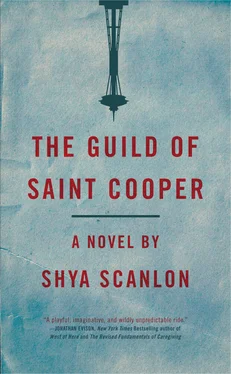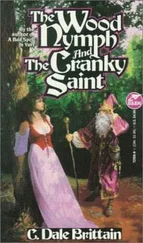“Well,” I said, suddenly on the defensive, “I think it’s a little unfair to blame Seattleites for the current situation. The scope here is global, right?”
“See, that’s the sloucher in you talking, Blake. You’re better than that!”
It occurred to me that this was not an argument. Ideas were not being exchanged. They were coming out of Russell’s head and they were hanging in the air, ripe fruit trying to tempt, but instead of plucking them I was letting them rot on the vine. I wondered how aware he was of this. I might be dealing with a legitimately crazy person not able to handle a dissenting point of view. Could he be dangerous? Could he have brought me up here to trap me? To throw me to the wolves?
“I think you have some compelling ideas,” I said flatly, “and a real vision for this city.”
He rolled his eyes.
“Okay,” I said, “that didn’t sound very convincing.”
“It sure as hell did not.”
“Here’s where I’m at. What I want to do is write about what’s going on here. I want to document. I want to describe. I want to push beyond the fantasy. No disrespect, but I’m sick of fantasy. Fantasy is what got us here! Seattle as it is right now is worth recording, worth remembering, and you’re part of that. What you’re doing is part of that.”
I was almost certain I’d offended him with the fantasy comment, but I had to indicate how much he was asking of me, show him the distance I’d have to cross for compromise.
The big man sighed, crossed his arms, looked east. Drops of sweat were beginning to stream down the side of his neck and disappear beneath the gauzy material of his shirt, and I realized that I was too hot too. The car was still on and the AC was blasting away, but with the top down most of the cold air escaped, defeated. He turned back. “So, what are you suggesting?”
“I’m suggesting embedded journalism. I’m suggesting you give me access to your operation, to the birth house and to the drugs and to the library and to whatever else is going on, and that I write a book about you. About the Guild of St. Cooper.”
Russell’s eyes grew thin and his smile seemed to hide a kind of biting. I began to lose hope. He climbed out of the car and walked across the road, where he leaned against the railing and looked off toward the mountain. His clothes hung from his heaping body like sheets of water. His thin hair danced in the breeze. A man imposing, nearly regal, when facing me seemed from behind inexplicably banal, and I tried to summon a level of reverence for him that would warrant the kind of attention I was suggesting. Or at least confidence.
When he turned back his face had lost its rigidity, and I climbed out of the car to meet him, to stand together.
“Even the most superior mind and the most powerful imagination,” said Russell, “must found itself on facts, which must be recognized for what they are.”
I smiled.
“Do you know who said that?”
I didn’t.
“So!” he said with a fat man’s chuckle. “I’ve stumped you.”
“What do you say?”
He held out his hand and I grabbed it quickly, not hiding my enthusiasm, and looked over his shoulder at a fight breaking out between two men. No one moved to break it up.
Russell regained my gaze, and tightened his grip. “You write your book,” he said, “but you work for me in exchange. You make Cooper come alive.”
Not thinking, I nodded. I said okay.
Russell squeezed my hand for another moment before letting it drop, and immediately he was smiling again. He turned around to watch the fight, put his arm around my shoulder.
“We’re going to have fun,” he said. “You’ll see.”
One of the men was being pushed perilously close to the edge of the bridge, and though I’d begun to think about how politely to retract my agreement, what I felt was not anxiety or tension or fear of what had come out of my mouth. What I felt, but could not quite reconcile, was relief. I was relieved; I was at ease. The man was now being held halfway over the railing and punched repeatedly in the face. What made the scene extraordinary was that the people around seemed not only unperturbed, they seemed indifferent. At the table nearest the fight, a bald man pulled in poker winnings with long white arms and let out a rippling, high-pitched laugh.
“Should we do something?”
“And you know,” said Russell, “I’ve got considerable time and manpower invested in the Dale Cooper idea already, but hell, if you can think of someone better, I’m more than willing to hear you out.”
Having stopped resisting, the beaten man hung limp over the edge, his aggressor gripping his shirt and speaking close to his face.
“Better?”
“Hell, if you want to make someone up entirely, we can talk about that too.”
The man was heaved over the edge. His legs flipped up and momentarily hung in the air, then disappeared, and that was that. The remaining man turned and rejoined the group. Russell turned and got back in the car.
“Holy fuck.”
“Seriously, Blake, can you come up with someone more interesting than Dale Cooper? I’m open. I’m willing. I’m ready to listen.”
That afternoon, I sat at my desk and tried to write down everything I could remember about Dale Cooper. I hadn’t seen Twin Peaks in probably ten years, though it had made an impression on me. It had been something I’d returned to occasionally, something that scratched an itch. I stared out across Ballard. The television series, like much of Lynch’s earlier work, had been paradoxically able to destabilize and to comfort. Twin Peaks had made me look at certain houses in my neighborhood differently, had made me skeptical of their quotidian façade, but it had also made me feel like there were at least some other people — people, I had to admit, like Special Agent Dale Cooper — who were there with me, standing outside the mystery and looking in.
Lynch’s later work, by contrast, afforded no such companionship.
I looked at my list:
Buddhism
Big jaw
Clean cut, “dapper”
Black suit, formal
Coffee, pie, big appetite, etc.
Belief in the supernatural
Respect for spiritual ways
Intuitiveness
Humility
Fascination/fixation with young women
Number ten stood out, but the general impression was a good one, and I could see how it might have struck Russell — at least, given a rabid flailing about for solutions, which must have been the case. Which was, after all, the case for most of us. Cooper’s suitability was nearly irrelevant, anyway — and not only because we’d create a history for him independent of what Lynch had envisioned. More important, there was no way I was going to fuck with the general contours of his profile. A line in the sand, sure, but it felt important to draw one. To push back, if only internally. To struggle against nonchalance in the outrageous face of our whole dark enterprise.
“I saw someone get killed today,” I said, out loud, to hear the words.
I felt a little crazy saying this, like I was implicating myself somehow, like I should be keeping it a secret. But the rising emotion quickly subsided and I was left with little more than a feeling akin to nostalgia. It had not been intolerable cruelty, after all. Hadn’t it been self-selected? Couldn’t the man who’d been pushed just as easily have been the pusher? Couldn’t the man returning to his seat have been the one who’d fallen? I went downstairs to find my mother sitting on the couch, reading. She was pale, frail, and nearly swallowed up by her overstuffed furniture. She looked like a newly hatched bird in its nest. A moment after I entered the room she turned the last page of her book and took a deep breath. Then she threw the book into the air.
Читать дальше












